計算機圖學 筆記
參考 清華大學 李潤容老師 計算機圖學講義
Introduction to Computer Graphics
What is Computer Graphics
| Input | Output | Category |
|---|---|---|
| Image | Image | Image Processing |
| Description Images | Description | Computer Vision/ Pattern Recognition |
| Description | Image | Computer Graphics |
Image Processing
- Performing various types of operations on an input image, and output an image with some useful information
- Ex: Edge Detection, Image Compression
Computer Vision / Pattern Recognition
- Computer Vision
- Building a artificial system that obtain information from images
- Pattern Recognition
- Classify data based on either prior knowledge or on statistical information extracted from the patterns
- Ex: Object Detection, Tracking, Classification, Recognition
Computer Graphics
- Concern the pictorial synthesis of real or imaginary objects from their computer-based models
- 2D graphics
- Ex: Texts, 2D lines/ polygons/ images…
- 3D graphics
- Project the objects onto 2D projection plane and render
- Types
- Passive Stereo
- The 3D effect is achieved by presenting slightly different images to each eye using techniques such as polarization or color filtering.
- Ex:Anaglyphic 3D glasses (紅藍 3D 眼鏡)、Polarization 3D glasses (偏光 3D 眼鏡)
- Active Stereo
- Involve synchronizing shutter glasses or alternate-frame sequencing with the display to present different images to each eye at high speed.
- Ex: Shutter Glasses、VR display
- Passive Stereo
Graphics Hardware System
GPU
- Graphics Processing Unit
- Very high complexity with massively parallelism
Frame Buffer
- Memory location for storing display data during processing
- Front buffer (Current display buffer)
- Back buffer (Nexy display buffer)
Screen/ Display Refresh
- Retrieve front buffer pixels for displaying pixel colors on screen
- Constant refresh rate
- Scan-line based display
- 從左上往右,一行一行往下顯示
Single Buffering
- Display after rendering complete
- cannot render during display
- Rendering during displaying
- Display incomplete result
- 畫面可能會有黑黑的

Double Buffering
- A techinique to prevent from displaying incomplete frame
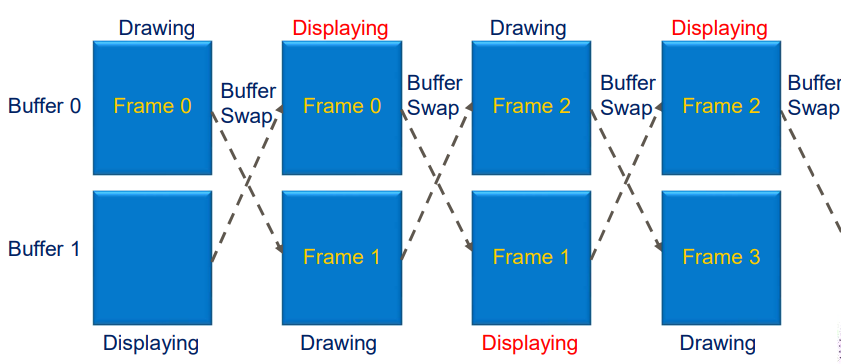
Full Screen Display
- Uses Double Buffering or Triple Buffering
- Flip display by changing display base address to corresponding buffer
Window Mode Display
- Uses Double Buffering or Triple Buffering
- Flip display by using 2D bitblt to move back buffer frame on to front buffer display
3D Graphics Pipeline
- Almost everything you see on the display is processed by the graphics pipeline
- Windows UI、Video Games 等
- 不過像播影片就不算,它是直接寫到 frame buffer,沒有經過 graphics pipeline
- It is realized by graphics hardware (GPU) or by software (CPU)
- 用 hardware 可以比較快,但如果沒有 GPU 加速,用 software (CPU) 也可以算
Graphics Rendering Process

3D Graphics Engine
- 屬於硬體,Graphics pipeline 就在這邊
Driver
- 不是所有的硬體可以解決所有問題,有些事情你會以為硬體幫你做,其實是 Driver 在做。有時候有 Bug,它會幫你用 Driver (software) 的方式繞過去,看起來是硬體修復了
- 做 Hardware 的人通常也負責做 Driver,雖然它算是軟體
Inside a 3D Graphics Pipeline
Fixed Function Pipeline
每個 Stage 功能都是寫死的,像是 Transform and Lighting,所以效果都看起來差不多,現在很少用

Programmable Pipeline
把 Fixed Function Pipeline 其中某幾個功能包裝成 Shader,讓 programmer 可以自己改,像是多了 Vertex Shader 來取代原本的 Transform and Lighting

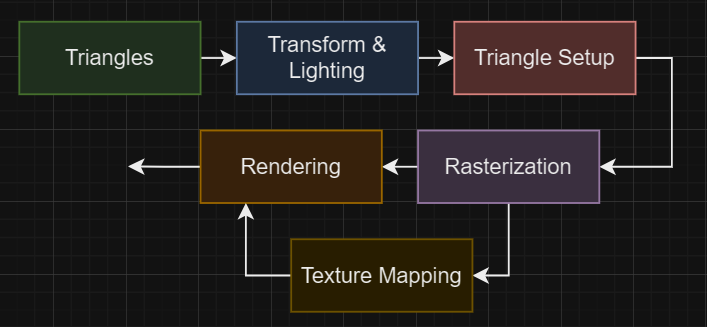
Modeling
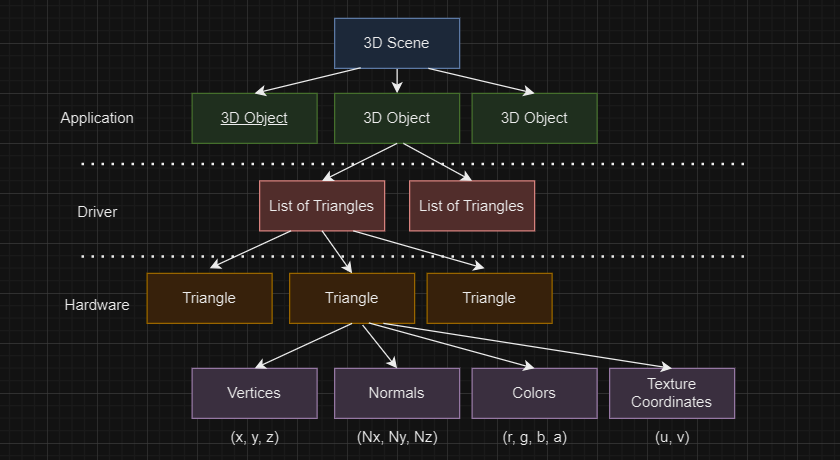
Transform
放大、縮小、平移、旋轉
- Geometrical Transformation (Model Transformation)
- From Object Space to World Space
- 每個物體有自己的座標系

- Viewing Transformation
- From World Space to View Space
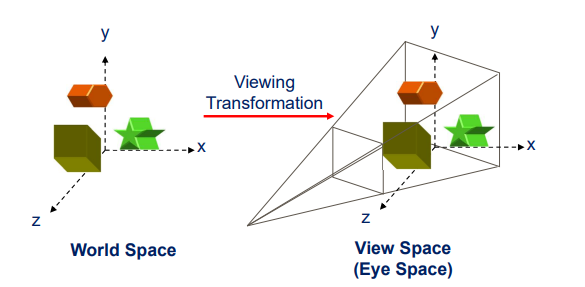
- Projection Transformation
- From View Space to Screen Space

Lighting
Simulate the Effect of Light-Object Interaction
- 簡化成 Ambient(環境光) + Diffuse(漫反射光) + Specular Reflection(鏡面光)

Triangle Setup
對於一個三角形,算出每邊的斜率,三個頂點的座標不一定是整數,但是畫的點座標必須是整數,所以要得到三角形內部的所有整數座標
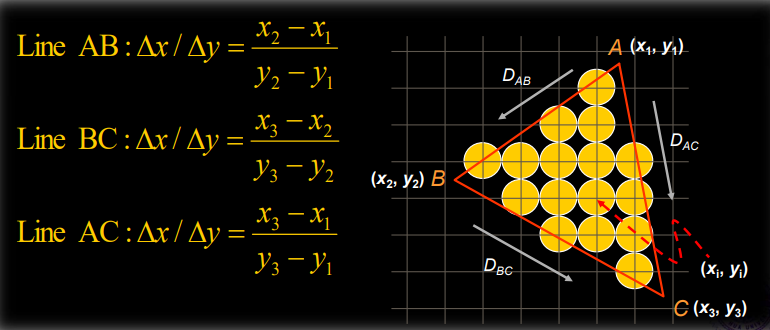
Rasterization
- 根據頂點的顏色,用內插法算出三角形內部的顏色
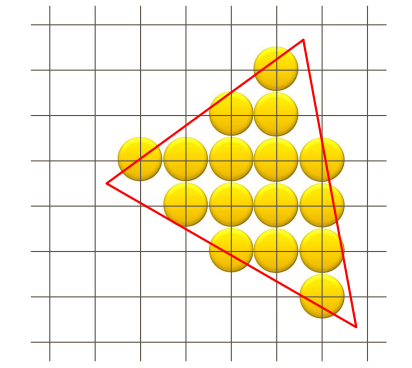
- Line Rasterization
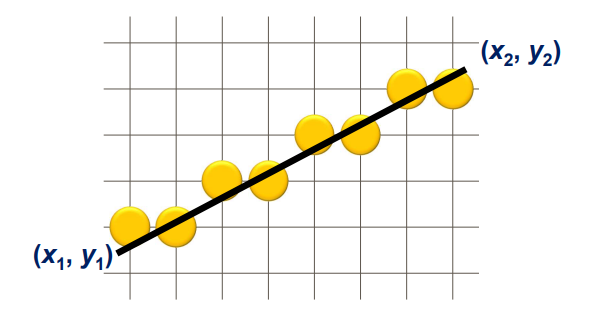
Hidden Surface Removal
移除被擋住、看不到的地方
Texture Mapping
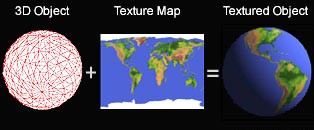
Rendering
Color Composition
Render with lighting and texturing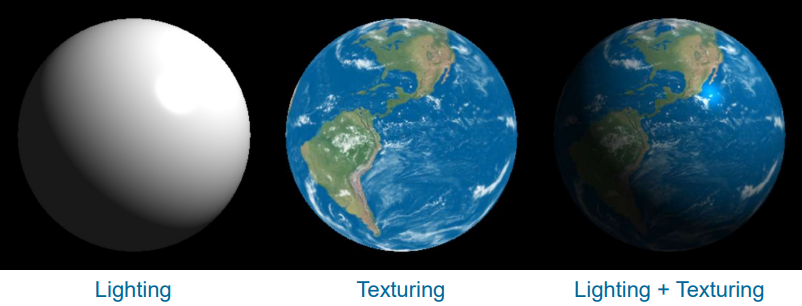
Blending
Translucent Effect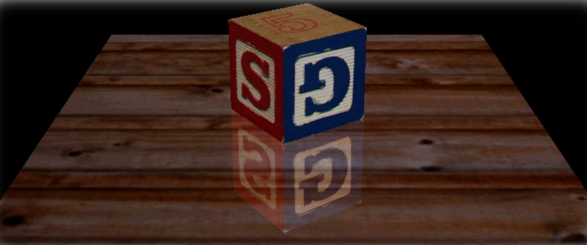
物體透明度和桌子透明度都變 50%,然後混合
Advanced Features
Shadow
- Hard Shadow
- Soft Shadow
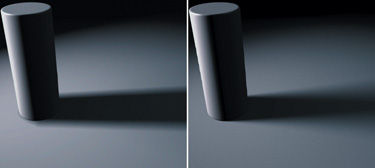
Anti-Aliasing
Smooth out the Jaggy Edges
Shader
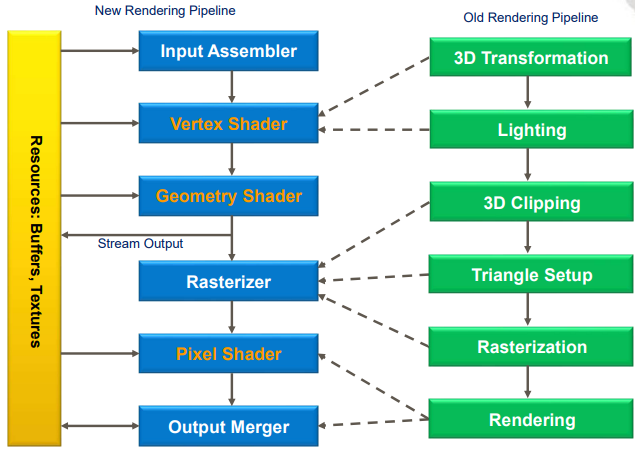
Vertex Shader
- Process vertices
- Transformation
- Lighting
- Displacement
- Operate on a single input vertex and produce a single output vertex
Tessellation/Geometry Shader
- 近的時候可以切成很多小三角形,遠的時候切比較大
- Process priitives
- Point sprite tessellation
- Wide line tessellation
- Shadow volume generation
- Surface subdivision
- Inputs one primitive and outputs can be more than one primitives
Pixel Shader
- Process pixels
- Texture mapping
- Color combine
- Per-pixel lighting
- …
- Inputs one pixel and outputs one pixel at same position, or no pixel at all
Introduction to OpenGL
What is OpenGL
- Open Graphics Library (OpenGL) is an open standard for cross-language, cross-platform API specification
- OpenGL is a set of APIs used to write 2D/3D graphics applications
- OpenGL defines the function specification of each API and leaves the implementation to the vendors themselves
- OpenGL 只有定 SPEC,具體怎麼做留給硬體廠商
- 每個硬體可能執行運算的方式不太一樣,像是做加法時,可能精度不一樣
Other Graphics APIs
- Direct3D
- Proprietary Microsoft Windows 3D graphics API
- Vulkan
- OpenGL ES
- OpenGL for Emnedded Systems
- Web-based OpenGL
- Metal
- Mantle
OpenGL vs. Direct3D
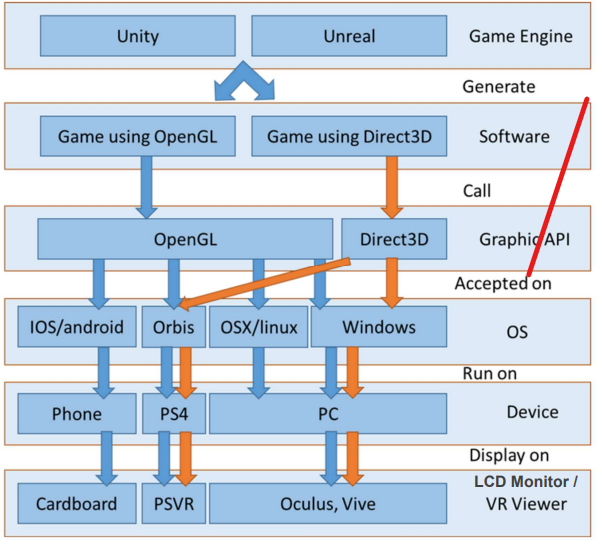
OpenGL Extension
硬體廠商可以寫自己的 OpenGL Extension,像是 AMD、NVDIA…
- Advantages
- Develop new functionality before new API spec is released
- Hardware vendors can expose their new hardware features via extension first
- Extension becomes core function (or extension) after being approved by ARB(Architecture Review Board)
- Disadvantages
- It is vendor specific before approved by ARB
- Compatibility
- GLEW/GLAD can help in querying and loading OpenGL extensions
Why OpenGL
- Cross-platform
- Windows Mac OSX, Linux
- Better backward compatibility
- 舊的 OpenGL code 通常還是可以跑
- Run on various hardware platforms
- OpenGL, OpenGL ES, WebGL
Convention of an OpenGL API
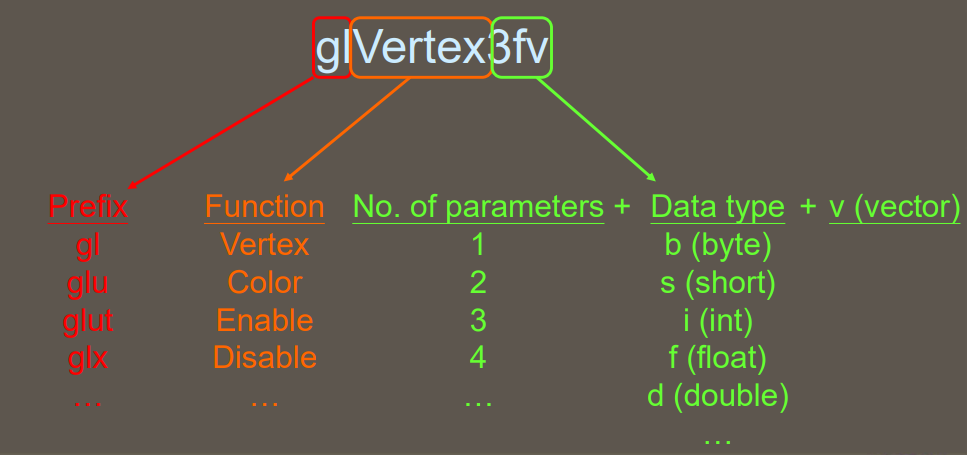
Data Types
C++ data types 和 OpenGL data types 大部分一樣,但還是有些許不同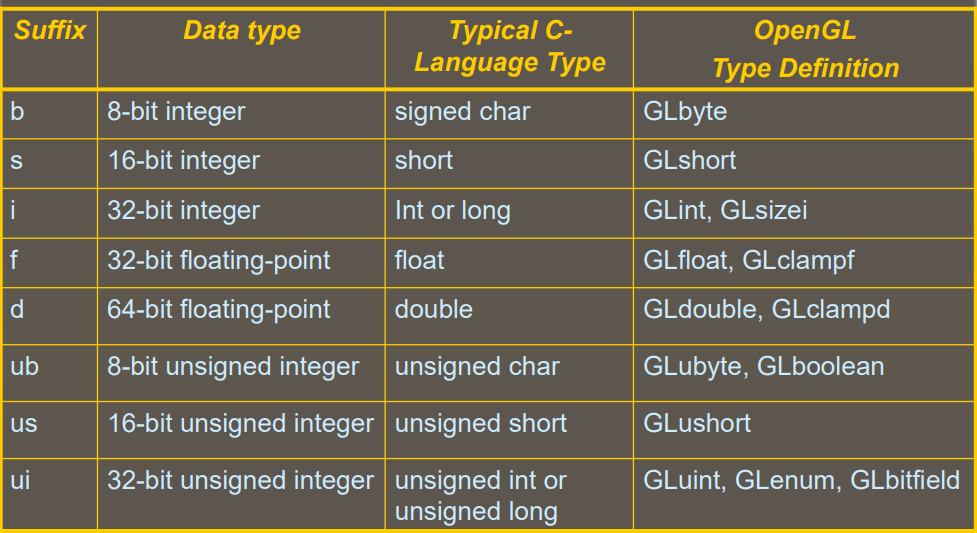
OpenGL Pipeline
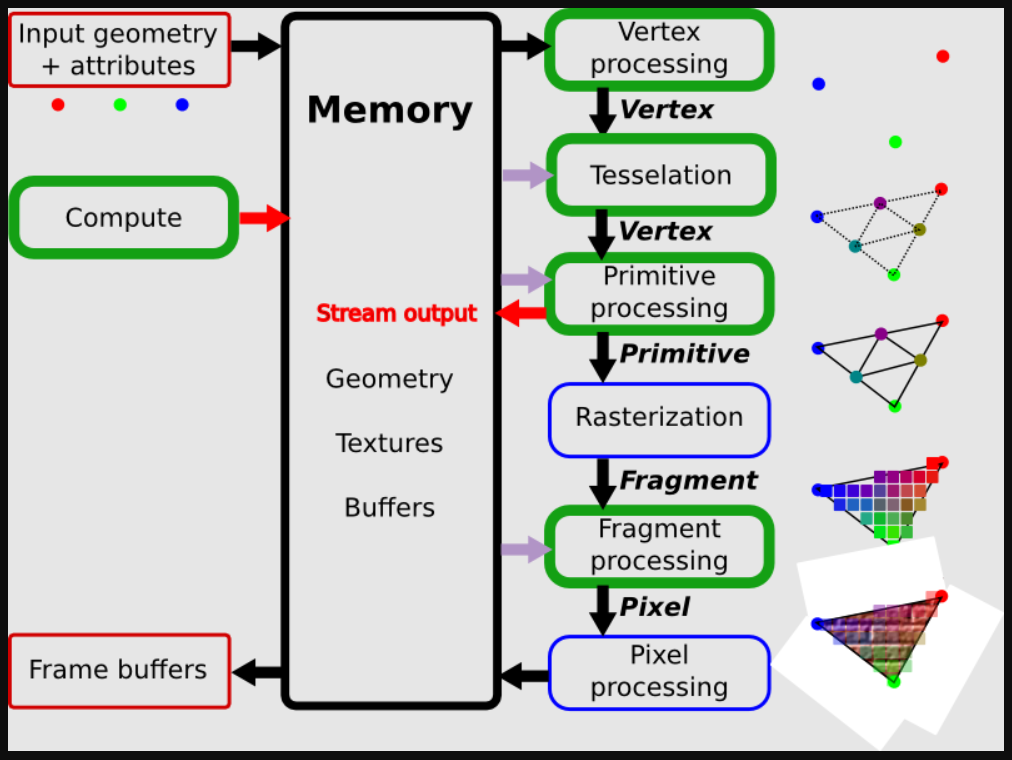
Image synthesis and OpenGL: graphics pipeline
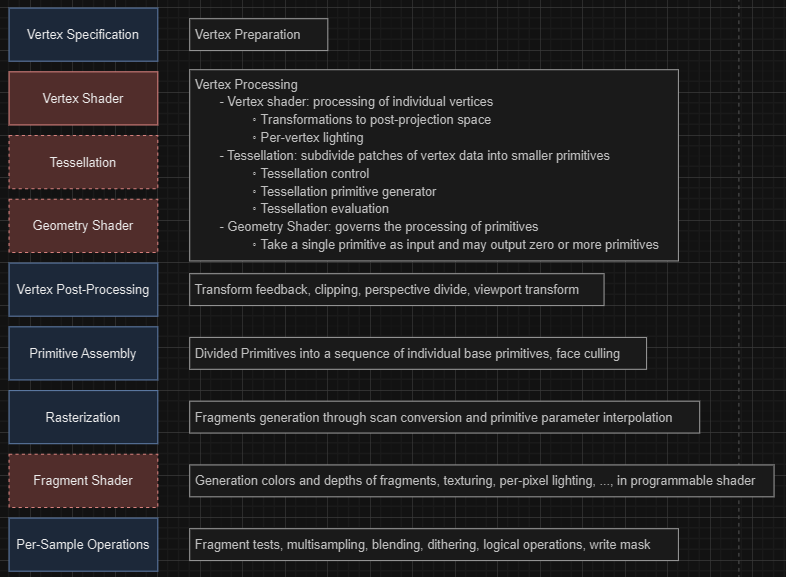
- 紅色代表 programmable,虛線代表可以不需要,但還是建議要寫 fragment shader 比較好
OpenGL Shading Language
- High-Level shading language based on C programming language
- DirectX + HLSL vs. OpenGL + GLSL
- Hardware vendors will provide shader compiler to optimize the shader codes for deriving best performance running on their hardware architecture
OpenGL 工具
OpenGL Context/Window Creation
- context stores all the states associated with the instance of OpenGL rendering
- window is the window where your rendering result displayed
- event handlings process different kinds of input such as keyboard and mouse
A cross-platform toolkit for writing OpenGL programs
- Support application frameworks to control the platform’s window system and event handling
GLUT
- Pretty old and no longer maintained
Freeglut
- An alternative to GLUT
- https://freeglut.sourceforge.net/
GLFW
OpenGL Loading Libraries
OpenGL loader checks the graphics driver for which OpenGL version profile is supported and gets all the function pointers as well as the supported extensions
GLEW
The OpenGL Extension Wrangler Library
- A cross-platform open-source C/C++ extension loading library
- Provides efficient run-time mechanisms for determining which OpenGL extensions are supported on the target platform
- http://glew.sourceforge.net/
GLAD
Multi-Language GL/GLES/EGL/GLX/WGL Loader-Generator based on the official specs
- An tool (with a web-service) for generating OpenGL, OpenGL ES, EGL, GLX and WGL headers (and loaders) based on the official XML specifications
- You can customized to the version you like without including those deprecated or legacy functions
- https://glad.dav1d.de/
Other OpenGL Useful Utilities
GLM
OpenGL mathematics libraries
- A header only C++ mathematics library for graphics software based on the OpenGL Shading Language (GLSL) specifications
- https://glm.g-truc.net/0.9.9/index.html
stb_image.h
Image and texture
- An image-loading library that supports several popular formats
- https://github.com/nothings/stb/blob/master/stb_imag
Asset/Model loader
Open Asset Import
- A loader with support to a variety of 3D file formats
- http://www.assimp.org/
TinyOBJ loader
- A simple wavefront boj file loader
- https://github.com/tinyobjloader/tinyobjloader
glm
- A simple wavefront obj file loader
- Not the OpenGL Mathematics Library
- http://devernay.free.fr/hacks/glm/
OpenGL Application Framework
[P42]
